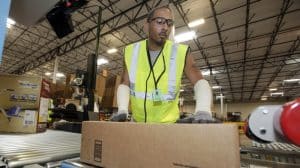
The court vote was 9-0 in ruling that employees of Integrity Staffing Solutions facilities, where merchandise is processed and shipped, do not have a right to compensation for the time spent in screening lines – up to half an hour each day – which the company enforces to prevent theft from the warehouse.
Though the case is state-based, the ruling is likely to apply to workers nationwide, benefiting other companies involved in similar lawsuits such as Amazon, CVS Health Corp and Apple Inc.
Justice Clarence Thomas’s briefing on the case stated that the screening process is not a “principal activity” of the workers’ jobs under the Fair Labor Standards Act — therefore it does not require compensation.
Workers receive pay only for activities deemed to be “an intrinsic element” of the job, and “one with which the employee cannot dispense if he is to perform his principal activities,” Thomas wrote.
The Supreme Court’s ruling was a reversal of an April 2013 ruling by the 9th U.S. Circuit Court of Appeals, which decided that screenings were indeed an integral component of the warehousing work, that they were carried out for the benefit of the employer and therefore should be compensated.
Justice Sonia Sotomayor, echoed by Justice Elena Kagan, wrote short concurring opinions to underscore that the high court’s ruling was consistent with Labor Department guidelines.
The case is Integrity Staffing Solutions, Inc v. Jesse Busk and Laurie Castro, U.S. Supreme Court, No. 13-433.
Violation of Workers Rights?
The ruling has provoked widespread criticism from U.S. workers, Employment Law attorneys, labor rights advocates, and many labor and business journalists. Noah Feldman of Bloomberg View thinks there’s “something fundamentally wrong with the court’s formalistic reasoning. The trouble lies in the logic of defining ‘principal activity’ as though it were some abstract philosophical question about the essence of the warehouse employees’ job. In reality, the ‘principal activity’ is the job as defined by the employer. Amazon need not define the job to require security screening, because of course you can work at a warehouse without stealing anything. But once the employer says that the job can only be performed if you get screened, it’s redefining the principal activity from ‘warehouse work’ to ‘warehouse work including screening.’”
And at The Los Angeles Times, Scott Martelle writes:
“If that is indeed the letter of the law, then Congress should change it. It’s unconscionable that an employer can detain a worker on the work site for purposes of making sure the employee isn’t stealing anything, without paying for the time. If standing in that line for nearly 2½ hours a week is a requirement of the job, then it should be paid as part of the job.”
At Slate, Alison Griswold makes a similar point: “This case is one where the law and the basic economic logic seem to be somewhat at odds. Because many companies with warehouse facilities like Amazon require these security checks, the workers have no option but to comply with them.”
And, she writes, “when employers aren’t required to pay employees for the time they spend waiting for those security checks, they have no incentive to make them more efficient.”





